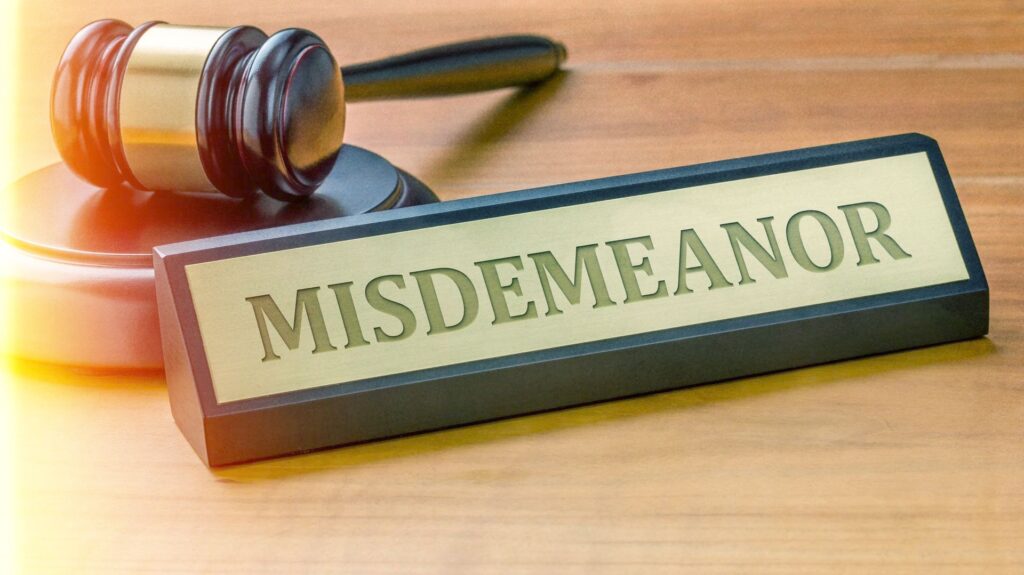A misdemeanor is a criminal offense that is known to be less grave than a felony offense. However, there are slight distinctions of what constitutes a misdemeanor depending on the state. In other words, any criminal offenses that incur a maximum of one year or less imprisonment are categorized under misdemeanors. However, in other States, longer jail terms could apply. The law that outlines a certain sort of misbehavior categorizes the crime as a misdemeanor. In some states, they classify a crime as a petty offense when the maximum punishment for the particular crime is at most six months imprisonment. In many states, crimes at the second level are grouped into different classes or categories. For example, states might have the following categories of misdemeanor offenses:
- Any crime or Class A misdemeanors that fall within the category may lead to imprisonment for a period of not more than one year.
- Summary offenses of class B that attract a jail term of up to six months.
- Other Class C misdemeanors that attract a jail term of not more than thirty days.
Differently from misdemeanors, penalties for felony offenses entail a conviction that would likely incur a penalty of over a year in jail.
Are crimes and misdemeanors the same?

A crime and a misdemeanor need to be distinguished even though both refer to a violation of the law. Offenses, on the other hand, are comparatively less serious, and they attract remedies such as fines or, in some extreme cases, imprisonment. Examples of crimes include murder, robbery, and drug trafficking. Correct. On the other hand, misdemeanors are relatively lesser crimes than felonies, and the punishments that accompany these crimes include fines, a minimum of service, or even a very short prison time. Some misdemeanants are accused of theft, public drunkenness, and vandalism, among other minor criminal offenses. Thus, any crime and misdemeanor are considered to be unlawful actions; however, the basic difference exists in the degree of the offense and, therefore, the punishment. It is necessary to distinguish between crimes and misdemeanors in order to achieve proper justice in the legal sphere.
Are the most serious types of crimes classified as misdemeanors?
The most severe crimes, as per the Dallas legal system, are not counted as misdemeanor crimes. However, misdemeanors are less severe than felons, and they normally receive fines, probation, community service, and or a jail term of not more than one year. Misdemeanors, on the other hand, are serious crimes such as murder, rape, or armed robbery and are likely to attract a jail term of more than one year, heavy fines, or the death penalty, sometimes depending on the state laws.
The general classification of criminal offenses as misdemeanors and felonies is relevant, bearing in mind that the degree of punishment that awaits a convict depends on the type of crime. Misdemeanor crimes are less severe compared to the others, and felonies are the worst incidents. People need to know the distinctions between these classifications to run across the legal system properly.
What is the most common misdemeanor?

Common misdemeanors include:
- That will not include cases of minor drug-related crime like possession
- Drunk driving
- Petty theft, including shoplifting
- Assault and battery of the lesser or simple category
- Trespassing
- Vandalism
- Solicitation, prostitution, and indecent exposure are minor sex crimes.
- Resisting arrest
- Some of the cybercrimes entail harassing or threatening, constituting such as stalking and bullying.
What is the difference between a misdemeanor and an infraction?
First and foremost, a misdemeanor is a crime, so one can face fines and sometimes imprisonment also. Non-serious crimes mostly do not attract prison terms of more than one year; that sets the misdemeanor apart from the felony. Still, fines for misdemeanors are generally much higher than for infractions, it is necessary to note. Maximum fines for misdemeanors differ from state to state. Depending on the type of misdemeanor, they can be in thousands of dollars.
Since a misdemeanor is a criminal offense, it means that the record of misdemeanor charges can show up on your criminal record. It has to be noted that misdemeanors are punished only in court. It does not in any way, therefore, imply that you have to be present in the court – your lawyer can represent you.
Local, state and even federal laws categorize certain actions as misdemeanors, including the following: Local, state and even federal laws categorize certain actions as misdemeanors, including the following:
It says some technical violations include unlawful possession of a narcotic drug, possession of marijuana, or any equipment that is associated with the use of the substance.
- Some moving traffic violations
- Operating a vehicle without insurance or with a suspended/revoked license
- Theft crimes that involve the taking of goods, the value of which is less than a certain value depending on the state in which it is committed, or the country is called petty theft or petty larceny.
- Simple assault
- Animal cruelty, for instance, involves dogs by either training them to fight or breeding them for the purpose.
- Some kind of domestic violence or abuse
- Disorderly conduct
- Trespassing
What is the smallest misdemeanor?
The offenses that may differ from one state to the other may include shoplifting, battery, which is the lowest level, disrespecting the police, and possessing a small amount of marijuana, among others. Though misdemeanors are not as grave as felonies, the offenders may receive citations, probation, forced donations to charities, community service, or min Life imprisonment is not possible for misdemeanors. Still, the offender may have to pay fines, serve probation, or spend the weekend behind bars. The classification of the smallest misdemeanor can vary depending on the state or country one lives in, which is why it is crucial to check the laws of the country, state, or province one lives in to know what constitutes the least severe misdemeanor.
What happens if you get a misdemeanor in Texas?
In Texas, if you are given a misdemeanor, the penalty you are likely to face depends on the degree of the misdemeanor. Misdemeanors are typically classified into three categories: They are Class A, Class B, and Class C, the latter being the least dangerous.
In Texas, a Class C misdemeanor, if one is found guilty, can lead to payment of a fine of not more than $500. In contrast, for a Class B misdemeanor, one is liable to payment of a fine of not more than $2000 or imprisonment for a period not exceeding 180 days. Class A misdemeanor comes with a fine of a maximum of $4,000 as well as imprisonment for up to a year.
Aside from monetary penalties or probation or, at most, confinement, a misdemeanor conviction in Texas also entails the appearance of a criminal record—a record that does not disappear no matter how long one has been convicted of the offense—thus complicating one’s chances in acquiring employment, applying for rental or loans, and renewing licenses in their prospective career.
Suppose you are charged with a misdemeanor in Texas. In that case, it is recommended that you seek the help of an attorney to understand your chances of a weak case or defense.